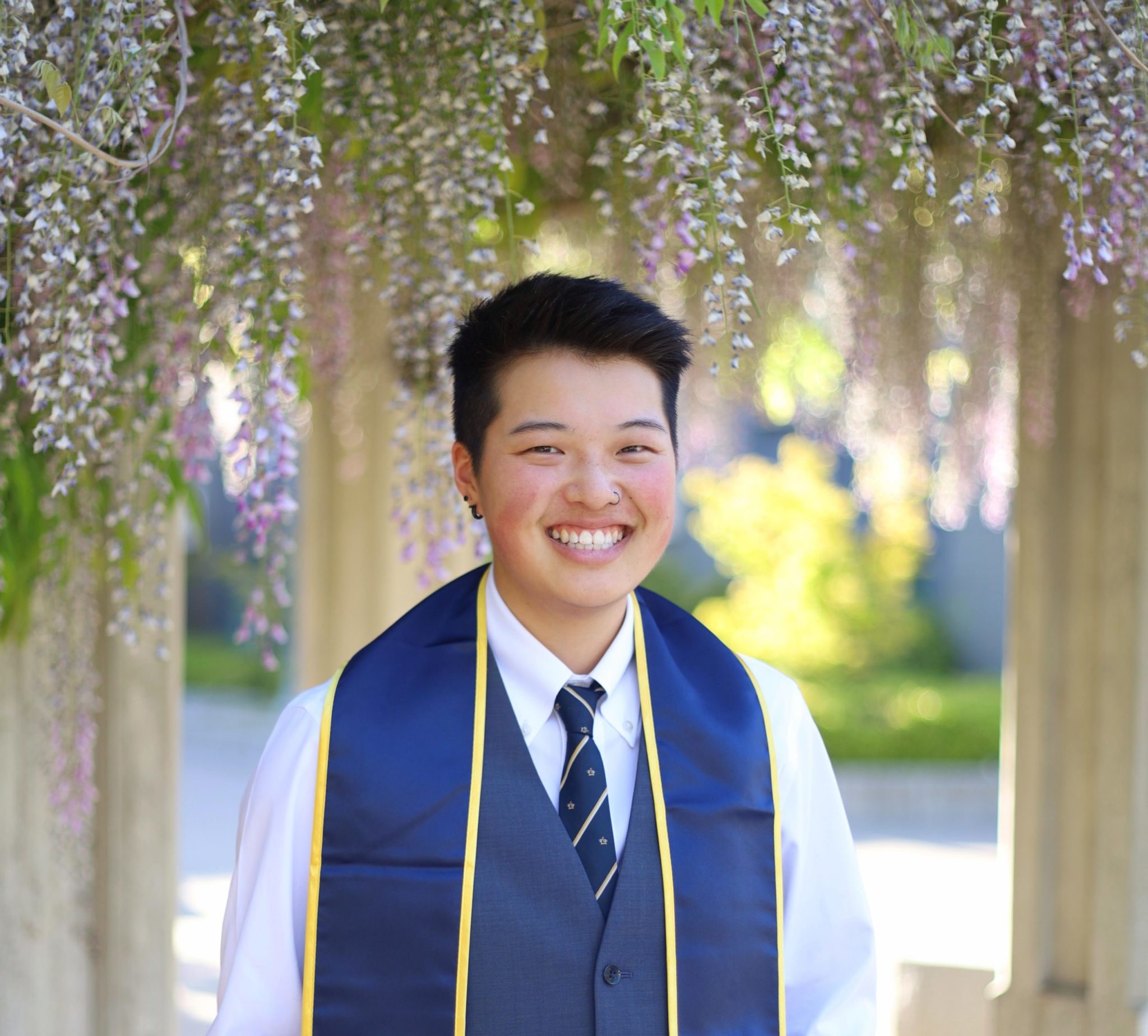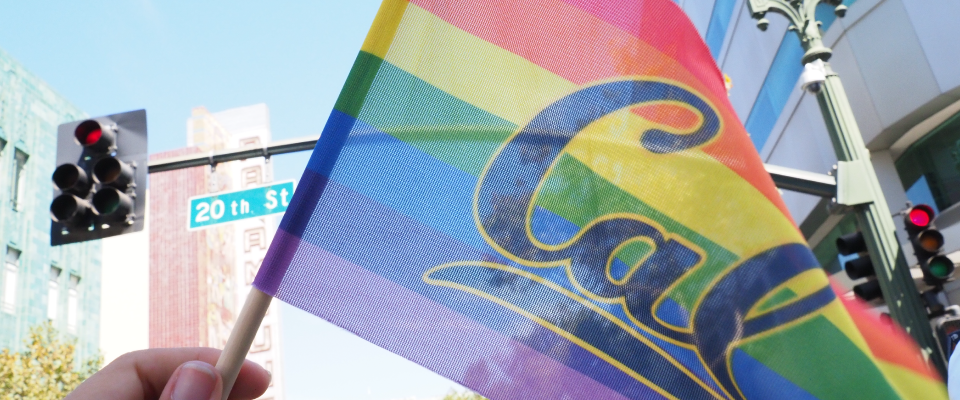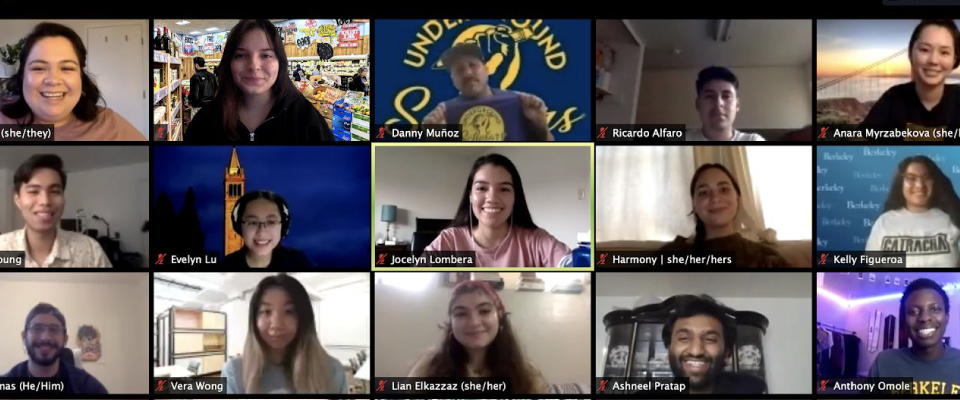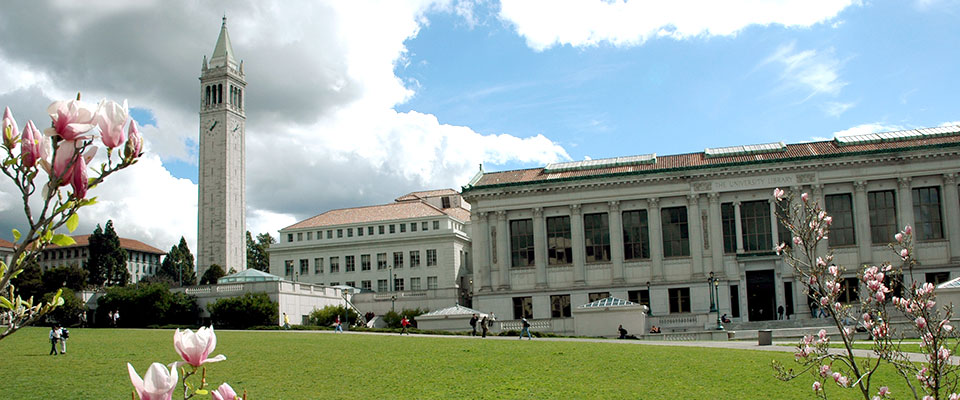Beyond academics, college is about finding yourself and becoming the person you want to be. This doesn’t happen in lecture halls, but in between classes, in student organizations, in dorms, and off-campus. For Lindsey Chung ’21, recipient of the Cal Pride Scholarship (2020-2021) and The Leadership Award (2017-2018, 2019-2020, 2020-2021), it’s here, there, and everywhere in between.
“It felt like… for the first time, [I’m] kinda taking control of what I wanted in my life,” Chung says.
They came out as queer to a couple of friends just before leaving high school. Upon acceptance to Cal, the first thing Chung did was contact a variety of the queer organizations on campus. The organization Cal Queer and Asian called back, extending an invitation to meet up. “That was really the first time that I’d been in a queer space like that, and the experience made me think I could totally see myself going to Berkeley.”
Through the course of their college career, Chung not only came into their gender identity but learned just how diverse trans experiences can be. They used skills learned from their social welfare degree, an interdisciplinary study with a focus on social justice, to maintain safe spaces for people with varied experiences.
“I’ve learned about communities and different experiences, and that didn’t necessarily happen in a classroom.”
Finding and fostering a community for trans people on campus led Chung to T-Cal, a peer support group for trans and nonbinary students. It was the first all-trans community that they were a part of, and they eventually became a facilitator for the group. “We come into that space with a really broad diversity of trans experiences,” Chung explains, “from the other identities that people hold to the gender identity that people hold, to the language that they like to use to describe their gender—or all of that. It’s just so diverse.”
While the experience and lives of trans people no doubt need more spotlight in broader conversations, during T-Cal meetings, the group’s main focus is to support members who might not find support anywhere else. There is a delicate balance to strike between maintaining a safe space and educating others about the trans experience without bringing up old wounds.
“We see headlines and things that can be very traumatizing and triggering within our group,” Chung explains. The Human Rights Coalition tallied 44 transgender and gender-nonconforming people who were murdered in 2020, the deadliest year since the HRC began keeping records. In 2021, 30 deaths have already been recorded. “[Giving] ourselves the space to just live and thrive as trans people at Berkeley is a radical act.”

In their second year, Chung and a few others launched GIA Magazine, an arts publication that centers the voices of queer and trans students of color, named after former ASUC Senator Juniperangelica “Gia” Loving. Despite facing many challenges presented by the COVID-19 pandemic, they were able to publish their first print edition this year. Chung hopes for the magazine to last beyond their time at Cal.
As a facilitator for T-Cal and an editor-in-chief for GIA Magazine, Chung has actively worked to elevate the voices of queer and trans BIPOC community members. However, they acknowledge that even within these spaces, there is always more work to be done.
“We all have internalized colonialism,” Chung acknowledges. Queer spaces have historically centered white voices or more mainstream queer identities. With each leadership position, Chung engages in “anti-oppressive work so all trans people are able to find community” at Cal.
Policing gender variance has broad negative impacts for both trans and non-trans people. In 2019, Chung published “Run Like a Girl,” a research paper on regulations of testosterone levels in female athletes. A ruling in 2018 by World Athletics requires female athletes with high levels of testosterone to take hormone-suppressing drugs. Caster Semenya, a world-leading South African middle-distance runner who produces a naturally high level of testosterone, was at the center of the controversial ruling. Her wins and impressive times at the 2016 Olympics set off a storm of conversations questioning Semenya’s gender. Semenya has been effectively banned from this year’s Olympic Games in Tokyo due to her natural hormone levels.
“I was able to find that this is just such a deep issue that goes beyond this one athlete,” Chung explains. “It touches on deep colonialism and the ways that the bodies of Black women are not accepted as feminine.” Chung’s research won honors from the Charlene Conrad Liebau Library Prize in 2019.

This past spring, Chung culminated their research work at Berkeley, with the thesis entitled, Accessing Gender Affirming Care from the Margins: Comparing the Strategies of Transgender People Pre-1980 and Non-Binary People Today. Chung found that despite the standardization of trans healthcare, many still face obstacles to accessing affirming care. This is especially the case for those whose experiences don’t fit the typical transgender narrative, such as nonbinary people and BIPOC trans people. Chung was again awarded the Charlene Conrad Liebau Library Prize for their research, and their 18 interviews and analysis that contributed critical data to the understudied area of nonbinary health.
Chung has many achievements to their name, and their work to champion trans and nonbinary voices is to be applauded. However, the work they’ve done internally is what they’re most proud of. “I’m really proud of the growth that I see in myself from when I stepped foot as a first-year in the dorms,” they reflected, “I’ve learned about communities and different experiences, and [that] didn’t necessarily happen in a classroom.”
Want to volunteer to review applications and interview finalists for the Cal Pride Scholarship? Contact Darek DeFreece at defreece@berkeley.edu. To support the Cal Pride Scholarship, please direct donations to The Cal Alumni Pride Leadership Scholarship by writing a check to UC Berkeley Foundation, and mailing it to Gift Services-U.C. Berkeley, 1995 University Ave, Ste 400, Berkeley, CA 94704. Please include the fund number FW7511000 on the memo line of the check. You can also make a gift by credit card by calling the Gift Help Desk at (510) 643-9789, Monday–Friday, 9 a.m. to 4 p.m.





















